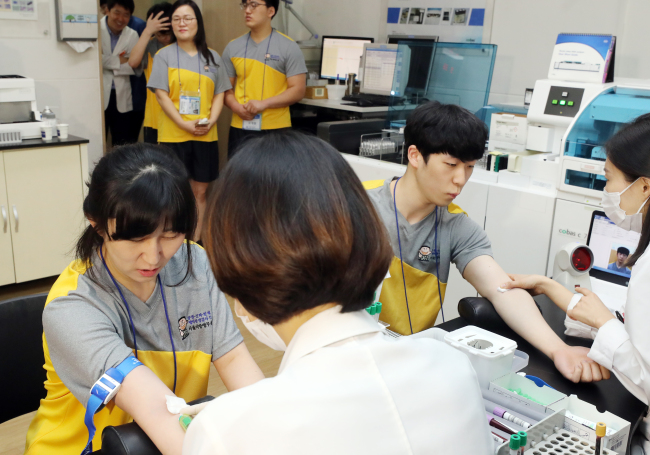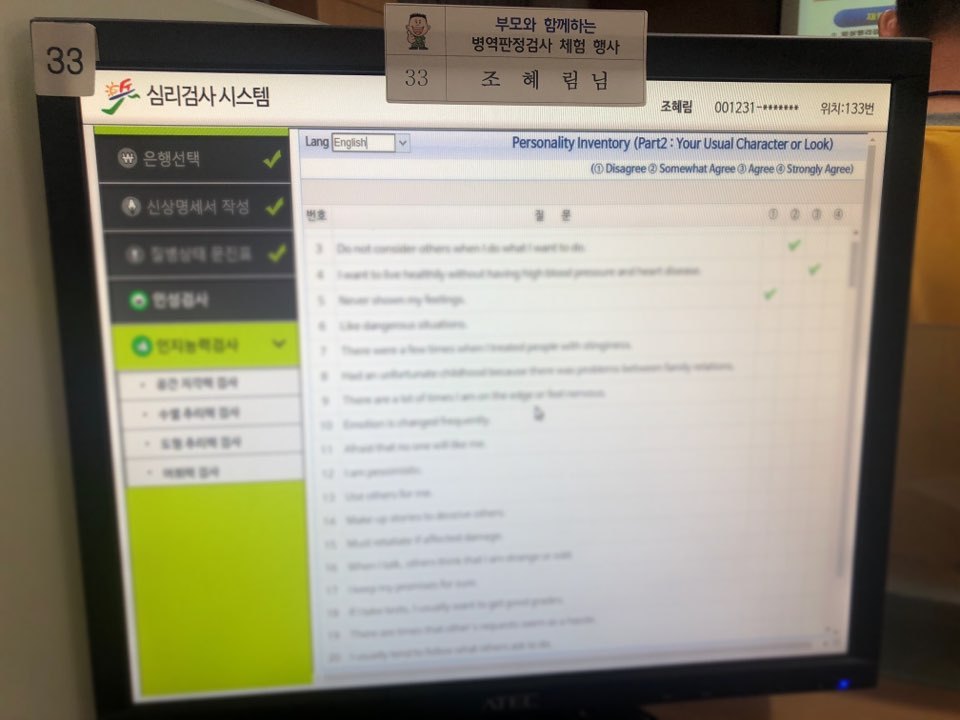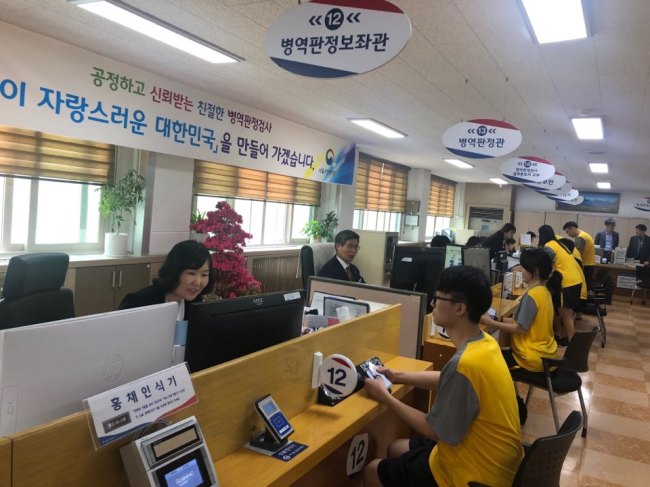[From the Scene] The first step toward military service: The medical exam
By Jo He-rimPublished : May 14, 2019 - 17:28
Upon receiving a letter from the Military Manpower Administration summoning him for his mandatory medical exam, Choi Seong-ryong, who had just turned 19, was both excited and worried. It signaled that he was now an adult with the responsibility to serve in the military.
Technically still at war with North Korea, South Korea maintains a draft system that requires almost all able-bodied male citizens aged 19 to 36 to serve in the military for about two years.
Technically still at war with North Korea, South Korea maintains a draft system that requires almost all able-bodied male citizens aged 19 to 36 to serve in the military for about two years.

The medical exam is the very first step in determining whether a conscript will serve as a soldier or a public service worker, or be exempted from service on health grounds. The notice for the check-up is sent in the year a young man turns 19.
On April 29, 180 young men in their late teens and early 20s gathered early in the morning for their medical exams at the Seoul Regional Military Manpower Administration. The military agency had also invited 17 parents that day, to give them a better understanding of the procedure.
Choi was among those young men, wearing the short-sleeved shirt and shorts provided by the agency. The atmosphere was lively and tense at the same time.
At the start of the inspection, each examinee receives a card that he has to tag on a machine to record the results of each test.
The examinees sat in front of the rows of computers to fill out medical forms and take personality tests and tests to measure their cognitive ability.

The answers to the questions -- 61 questions on the medical questionnaire, 271 questions on the personality test and 58 questions on the cognitive ability test -- are analyzed to determine the young men’s fitness for service and adaptability to a communal living environment.
The personality test, which is also available in English, screens for addiction and suicidal impulses.
“The questionnaires are designed for those in their 20s,” a clinical psychologist at the site explained. “The military is where dozens have to cohabitate, and it is important that those who should not go, do not go to the military.”
Park Joong-won, the father of a 19-year-old examinee, said it he had not been aware that the military check-up included psychological tests.
The examinees had their blood pressure measured and also took chest X-rays. Those found to have orthopedic or neurological problems would also get CT or MRI scans, with the results provided the same day.
The agency has introduced iris recognition devices in all regional administration buildings so that the authorities can tell identical twins apart.
Urine and blood tests were also conducted to measure 40 health markers, including HIV status, hepatitis B and C virus status, white blood cell count and cholesterol level.
“It is my first time getting such a thorough medical test in my life. It is different from the kind of check-ups we received in school,” Choi Min-hyeok, 19, told The Korea Herald.
Choi came with both of his parents. His father, Ha-young, explained that much had changed since he received his military medical exam in 1981. The tests he had to undergo then were conducted in an “inhumane manner,” he recalled.
“Some 200 to 300 men would stand in line in a cold hall, wearing only white underwear.”

Even now there is room for improvement, Choi said, asking why the examinees needed to wear short sleeves and shorts when the exam rooms were so cold.
As women are not subject to conscription, the mothers were curious about the medical exam.
Women wishing to serve in the military apply separately as commissioned or noncommissioned officers, and their medical check-ups are conducted by the branch of the military they choose to serve.
Near the end of the three-hour medical exam, the examinees get their eyes examined and their height and weight measured.
Finally, the young men are moved to the third floor to learn the results of their check-ups before a final determination is made on placement or exemption.
The final evaluation involves assigning a grade from 1 to 7, based on the analysis of the physical exams and other tests conducted at the MMA.
Men who receive grades of 1 to 3 have to serve in the military, while those who get a grade of 4 are assigned to reservist duty, meaning they will serve as public service workers at government institutes and public facilities. Those with 5s and 6s are exempted from military service, while those with 7s must undergo re-examination.
Every year, at least a couple of men, and sometimes dozens, are caught attempting to evade military service. Recently, eight examinees were found to have self-inflicted temporary hearing impairment, caused by listening to loud noise right before their medical exams.
The idea that military service is “a rite of passage into manhood” is widespread. For this reason, some young men fear receiving a grade lower than 4.
One of the examinees was worried about being underweight.
“I am worried that I will be discriminated against by others (if I do not serve in the military), and that it will be considered a weakness when I try seek employment,” the 19-year-old told The Korea Herald.
The examinees received the documents containing their grades and medical exam results.
“I plan to join the military service after I enjoy some college life,” Choi Seung-ryong told The Korea Herald after he received Grade 2.
“Every (Korean) man in this country has to go through this once in his life. So I guess it is part of life,” Choi added.
By the end of this year, about 325,000 men will have taken the medical exam, according to the manpower administration.
“We try to do our best to conduct a thorough and fair examination, and we have also introduced some high-tech equipment to improve accuracy,” Ki Chan-soo, the commissioner of MMA said.
“Aside from its role in determining whether one can serve in the military, the medical exam has been developed to be the first-ever comprehensive medical exam for the young men of Korea,” Ki said.
By Jo He-rim (herim@heraldcorp.com)



![[AtoZ into Korean mind] Humor in Korea: Navigating the line between what's funny and not](http://res.heraldm.com/phpwas/restmb_idxmake.php?idx=644&simg=/content/image/2024/04/22/20240422050642_0.jpg&u=)


![[Exclusive] Korean military set to ban iPhones over 'security' concerns](http://res.heraldm.com/phpwas/restmb_idxmake.php?idx=644&simg=/content/image/2024/04/23/20240423050599_0.jpg&u=20240423183955)
![[Herald Interview] Why Toss invited hackers to penetrate its system](http://res.heraldm.com/phpwas/restmb_idxmake.php?idx=644&simg=/content/image/2024/04/22/20240422050569_0.jpg&u=20240422150649)
![[Graphic News] 77% of young Koreans still financially dependent](http://res.heraldm.com/phpwas/restmb_idxmake.php?idx=644&simg=/content/image/2024/04/22/20240422050762_0.gif&u=)







![[Exclusive] Korean military to ban iPhones over security issues](http://res.heraldm.com/phpwas/restmb_idxmake.php?idx=652&simg=/content/image/2024/04/23/20240423050599_0.jpg&u=20240423183955)



![[Today’s K-pop] Ateez confirms US tour details](http://res.heraldm.com/phpwas/restmb_idxmake.php?idx=642&simg=/content/image/2024/04/23/20240423050700_0.jpg&u=)